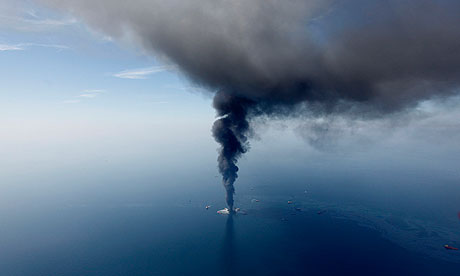
Now that the most recent attempt has failed to stop the oil from hemorrhaging into the Gulf--as it turns out, dropping a 98 ton milking machine on top of the leak is just as stupid as it sounds--it seems an appropriate time as any to re-assess the morbid assessments of just how bad this thing is going to be and just what we can expect our wizened representatives in government to do about it.
A week ago, Ezra Klein posted excerpts of the following report from Cumberland Investors. Beginning with the best-case scenario:
Containment chambers are put in place and they catch the outflow from the three ruptures that are currently pouring 200,000 gallons of oil into the Gulf every day. If this works, it will--At this point, I think we can comfortably skip ahead to the doomier and gloomier scenario:
This spew stoppage takes longer to reach a full closure; the subsequent cleanup may take a decade. The Gulf becomes a damaged sea for a generation. The oil slick leaks beyond the western Florida coast, enters the Gulfstream and reaches the eastern coast of the United States and beyond...Monetary cost is now measured in the many hundreds of billions of dollars. (Ezra Klein)For the Gulf economy in particular, to say nothing of the possible (let's say, likely) ecological catastrophe, we might be witnessing the end of the end for the region's fishing industry.
The Louisiana coast includes 3 million acres of wetlands that serve as a nursery for game fish such as speckled trout and red drum and are currently nurturing the brown shrimp crop to be harvested by the state’s fishing fleet.Louisiana is the largest seafood producer in the lower 48 states, with annual retail sales of about $1.8 billion, according to state data. Recreational fishing generates about $1 billion in retail sales a year, according to the state.
“Our marshes are nurseries and if those marshes are impacted, those juveniles that are dependent on feeding in those marshes will be affected too,” [Karen] Foote said in an interview...Those species include shrimp, oysters, crab, menhaden and game fish that have made Louisiana a destination for seafood lovers, commercial harvesters and anglers[.] (Business Week)
Oil production and fishing are two of Louisiana's largest industries. From an economic standpoint, B.P. might be finishing what Katrina started.
All oil comes from someone’s backyard, and when we don’t reduce the amount of oil we consume, and refuse to drill at home, we end up getting people to drill for us in Kazakhstan, Angola and Nigeria — places without America’s strong environmental safeguards or the resources to enforce them.
Kazakhstan, for one, had no comprehensive environmental laws until 2007, and Nigeria has suffered spills equivalent to that of the Exxon Valdez every year since 1969. (As of last year, Nigeria had 2,000 active spills.)...Effectively, we’ve been importing oil and exporting spills to villages and waterways all over the world. (New York Times)
Optimism for more far-sighted policy might not be entirely unfounded. Aside from the predictable revulsion and panic, my initial thoughts on the spill were that, coming so soon after the Massey coal mining disaster, it might prove to be a toxic contradiction sufficiently enormous and awful to catalyze real change. At the very least, the reasonable and naive spectator might hope, we should expect a series of re-regulation measures ranging from worker safety to environmental, if not a full upheaval in our national energy policy. This could be something as broad and patently necessary as Margonelli's set of off-the-cuff recommendations:
a comprehensive oil reduction dependency act that aligns highway policy with reducing subsidies with a loan program that allows middle-class people to get much more efficient cars to natural gas trucking to incentives for businesses to cut gas usage. (Ezra Klein)I suspect that the president's bully-pulpitting on this issue is a necessary but not a sufficient condition for change. But with the majority of the affected states boasting political representatives heavily financially dependent upon the petroleum industry and populations largely suspicious of federal regulation and reform, even if Obama should overcome his lack of credibility on this issue and discover his inner-Lyndon Johnson in the process, I find it difficult to prepare myself for anything other than disappointment.



This is really an area where I feel Obama is just not going to be able to do much, and it's heartbreaking. A moratorium makes good sense and all, but the heavy legislative stuff is just out of his hands and sitting in the hands of a large group of people who have no interest in tackling it during an election year, and even if it weren't an election year are barely willing to admit that this kind of thing is a problem. Good point, too, seeing this crisis as part of a way bigger demand problem, rather than simply a question of poor regulation or isolated environmental issues. Until green energy is taken seriously, until cap and trade is passed, this shit will just keep happening.
ReplyDeleteStaggering, that's all I can say about it. I don't hold out hope for any change in anyone's stance towards drilling, towards the use of fossil fuels, or towards corporate capitalism's deathgrip on us all. B.P. need only wait for the news cycle to move on, and it will have, I suspect, a free hand in throwing a tarp over the whole thing. But God, the damage that has been done--I have no words.
ReplyDelete